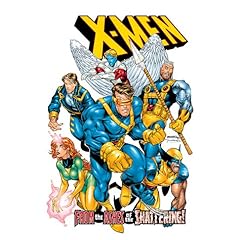Astonishing X-Men: Deathwish
Collects: X-Men #92 and 95, Astonishing X-Men #1-3, Uncanny X-Men #375 (1999)
Released: October 2000 (Marvel)
Format: 160 pages / color / $15.95 / ISBN: 9780785107545
What is this?: The X-Men shatter, help a child in trouble, learn a shocking secret about Wolverine, and are attacked by Apocalypse’s latest horseman, Death.
The culprits: A crossover crew including writers Alan Davis and Howard Mackie and penciler Brandon Peterson
Astonishing X-Men: Deathwish comes from an early time in the development of Marvel’s graphic novel program. In 2000, the Essentials line was in its infancy, and Marvel was scrambling to put some of its classic storylines into print while also getting “new classics” into circulation. Deathwish belongs to that latter category, as the book was published under the “Marvel’s Finest” banner soon after the floppies were released.
So what we have here is fin de siècle X-Men. All the stuff between Chris Claremont leaving and Grant Morrison arriving should be regarded with suspicion, but writer Alan Davis’s run was a rare bright spot during that time. Unfortunately, we get only glimpses of what he was doing as plotter of X-Men (script by Terry Kavanagh) and writer of Uncanny X-Men.
 Deathwish runs into the fringes of “The Shattering,” in which the newly returned Xavier seems to be having a mental breakdown. Most of the team says, “Sod it,” and takes a vacation; the rest don’t leave quickly enough and get drawn into the eponymous Astonishing X-Men miniseries. Bad luck for them, then. When Astonishing is over, everybody gets pulled back to hear a couple of shocking secrets, be psychically beaten by Xavier like a rented mule, and then get in a fight with the real villains.
Deathwish runs into the fringes of “The Shattering,” in which the newly returned Xavier seems to be having a mental breakdown. Most of the team says, “Sod it,” and takes a vacation; the rest don’t leave quickly enough and get drawn into the eponymous Astonishing X-Men miniseries. Bad luck for them, then. When Astonishing is over, everybody gets pulled back to hear a couple of shocking secrets, be psychically beaten by Xavier like a rented mule, and then get in a fight with the real villains.
The scene with Xavier spoils the straightforward charm of Davis’s work in Deathwish. X-Men #92, in which Davis and Kavanaugh set up the miniseries, works well, with Davis showing Xavier’s apparent instability and paranoia believably and giving nearly everyone a reason to skedaddle. He portrays the reactions to the death at the end of Astonishing well, and the final big fight is clever enough. But Xavier … to test loyalties, he merges the Danger Room and his psychic abilities to make the X-Men think they’re killing one another. Not satisfied with that, he makes the survivors watch their loved ones die. It is, frankly, a horrifying experience, especially since a teammate had just died in reality, and I’ve never been sure how the psychic test part worked. The worst point is no one calls him on it. It seems out of character that no one except Gambit would complain about him putting the team through a simulation that called for betrayal and death.
Unfortunately, Davis’s work on the X-titles is marred in the reprints by other titles. In this case, it’s with the miniseries Astonishing X-Men, written by Howard Mackie. Nothing puts the fear in an X-fan like realizing they’re reading Mackie’s work, except perhaps the Onslaught crossover. Fortunately, it’s not as bad as Mackie’s reputation might lead one to think.
It’s not great either; it’s a forgettable story, saddled with the Mannites, who are a bunch of childlike ciphers who are supposed to be even mutantier than mutants. The cobbled-together team, which includes the alternate universe X-Man and Cable, works together far more smoothly than it should, and the plot is more overwrought than necessary. The story doesn’t flow all that smoothly, either; there were a few points where I wondered what was going on and how far the two groups of people were from each other and how did they get there, anyway? It’s all just three issues in search of a dramatic revelation, and it delivers that in the end. I won’t spoil it, but it’s better if you just have someone tell you that revelation and skip those three issues.
The art is very good for a crossover, especially Adam Kubert’s issue of Uncanny X-Men. I’ve long been a fan of Kubert, ever since I first saw his work in Wolverine in the early ‘90s. This isn’t as vibrant and sharp as those issues seemed to me, but it’s still quality work. Brandon Peterson does a good job on Astonishing — the art certainly outdoes the writing — and although the style of Bret Boothe, who assists with pencils in #2, is noticeably different, it isn’t jarring, especially by the standards of crossovers. Jeff Johnson and Tom Raney work ably on the X-Men issues.
The book is out of print at the moment, but an expanded version of the title (X-Men: The Shattering) is listed as a future release by Amazon.com. The book hasn’t shown up in Marvel’s solicitations yet (and perhaps never will), but that listing plus the publication of the following Uncanny X-Men / X-Men issues is a small indication these stories will be back in print again.
I can’t particularly recommend Deathwish because the Astonishing X-Men miniseries takes half the book, but with the expanded contents, The Shattering might be worth checking out.
Rating: ![]()
![]() (2 of 5)
(2 of 5)
Labels: 2, Adam Kubert, Alan Davis, Brandon Peterson, Howard Mackie, Hulkbuster base, Marvel, Uncanny X-Men, X-Men




0 Comments:
Post a Comment
<< Home